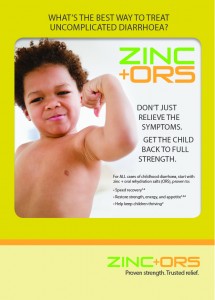Zinc in Human Health
Without zinc, there is no life. All living things need zinc in order to grow and function. In the human body, zinc’s job is endless. Zinc is used to generate cells, to activate growth and development of bones and major organs, and to enable brain functions, including memory, sensory messaging, and cognition. Of all the micronutrients, zinc has the strongest effect on our immune system and can prevent disease and fight infections.
 Children are the most adversely affected by inadequate zinc intake because their immune system is not fully developed and they are growing at the most rapid rate. Among other harmful effects, zinc deficiency is most notably accountable for growth retardation, stunting, impeded intellectual development, and vulnerability to diarrhea and pneumonia, the two biggest killers of children under 5. The World Health Organization (WHO) estimates that 800,000 people die annually due to zinc deficiency, with 450,000 of these being children under the age of five.
Children are the most adversely affected by inadequate zinc intake because their immune system is not fully developed and they are growing at the most rapid rate. Among other harmful effects, zinc deficiency is most notably accountable for growth retardation, stunting, impeded intellectual development, and vulnerability to diarrhea and pneumonia, the two biggest killers of children under 5. The World Health Organization (WHO) estimates that 800,000 people die annually due to zinc deficiency, with 450,000 of these being children under the age of five.
But there is hope. Zinc deficiency can be addressed in many different ways. For the immediate needs of children suffering from chronic diarrhea, zinc and ORS treatments can greatly reduce the severity and duration of these episodes, which can save millions of lives every year. While zinc is crucial to the treatment of diarrhea, it also plays a major role in the prevention of it and other health problems related to zinc-deficiency. If children receive adequate zinc nutrition in their diets from the start, the effects of zinc deficiency could all but be eliminated.
 Zinc supplements and zinc-fortified foods are often seen as more long-term solutions to zinc deficiency. Zinc supplements added to diets of undernourished children are inexpensive and relatively easy to administer.
Zinc supplements and zinc-fortified foods are often seen as more long-term solutions to zinc deficiency. Zinc supplements added to diets of undernourished children are inexpensive and relatively easy to administer.
Without doubt, the best way to ensure adequate zinc intake is to eat foods that are naturally rich in zinc, such as meat, fish, poultry, whole grains, and dairy. For many, however, access to any kind of food, let alone nutritious foods, is a lifelong challenge. While no country is without zinc deficiency, it is far more prevalent in food insecure countries in which people get most of their caloric intake from cereal grains. If those grains are grown in zinc-deficient soils, the risk of zinc-deficiency is heightened.
Visit the Official ZINC SAVES KIDS website.
Zinc Saves Kids is an IZA-sponsored program partnering with UNICEF.
Zinc Saves Kids
Zinc Saves Kids is one way that IZA is responding to the urgent problem of zinc deficiency. The campaign supports UNICEF’s zinc programs to improve survival, growth, and development of undernourished children throughout the world. ZSK’s work began in Nepal and Peru, countries in which zinc deficiency is widespread. Since then, zinc deficiency has gained the attention of other major international organizations and governments, and the fight to save lives with zinc treatments has expanded to other nations to combat child mortality.
